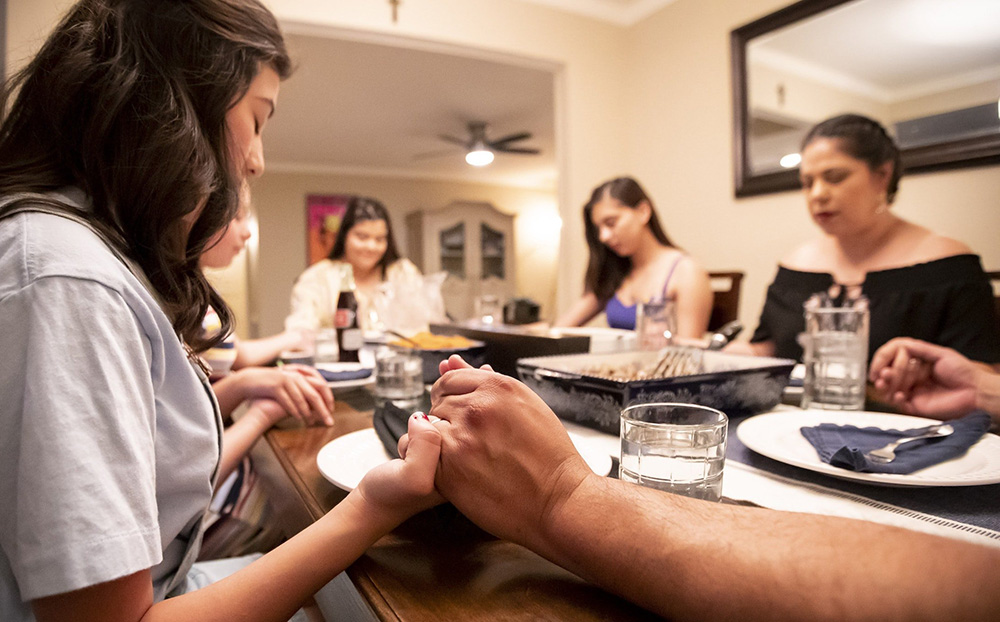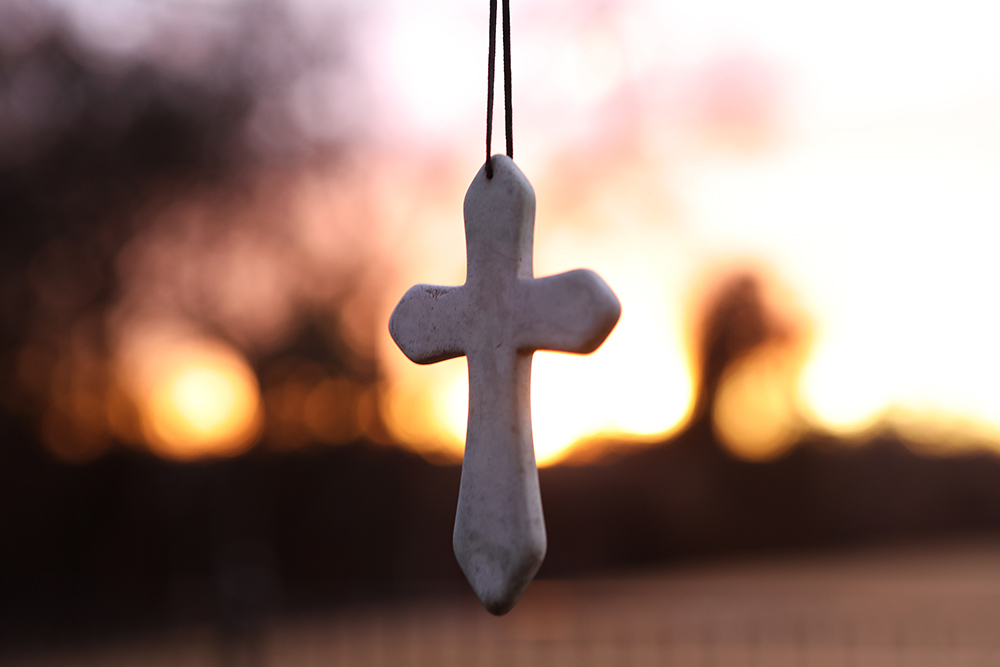
A family prays around the dinner table. At higher rates than other groups studied in a new Pew survey, spiritual* Catholics said that "being connected with loved ones who've passed" and "continuing family traditions" were essential to what being spiritual means to them. (OSV/Courtesy of Detroit Archdiocese)
In a new study, 46% of spiritual* U.S. Catholics said that "finding a set of beliefs that I make for myself" is essential to what being spiritual means to them, a higher percentage than any other religiously affiliated group studied. Among all spiritual* religiously affiliated people, 36% responded similarly.
A new Pew Research Center poll conducted July 31-Aug. 6 surveyed 11,201 U.S. adults on their spirituality in an effort to better understand the "spiritual but not religious" group. This is the first time that Pew has asked these questions, and the center hopes to compare this survey to future surveys to track changes in spiritual beliefs, practices and experiences.
Spiritual* Catholics also responded that "being connected with loved ones who've passed" (41%) and "continuing family traditions" (39%) were essential to what being spiritual means to them, higher rates than any other religiously affiliated or religiously unaffiliated group studied.
Thirty-one percent of spiritual* religiously affiliated and 32% of spiritual* religiously unaffiliated said that "being connected with loved ones who've passed" was essential. For "continuing family traditions," 30% of spiritual* religiously affiliated and 19% of spiritual* religiously unaffiliated said it was essential.
64% of spiritual Catholics said that it was 'definitely' or 'probably true' that people who have died 'can provide assistance, protection or guidance to people who are still living.'
Seventy-one percent of U.S. Catholics said that it was "definitely" or "probably true" that people who have died can "be united with other loved ones who have already died," and 64% of Catholics said that it was "definitely" or "probably true" that people who have died "can provide assistance, protection or guidance to people who are still living." Both percentages were higher than any other religiously affiliated or unaffiliated group surveyed.
Among all religiously affiliated, only 49% said that people who have died "can provide assistance, protection or guidance to people who are still living."
Forty-four percent of spiritual* Catholics said that "being connected with nature" was essential to what being spiritual means to them, higher than any other religiously affiliated group. Thirty-seven percent of spiritual* religiously affiliated people had similar responses.
For the most common responses to the question about how essential "being connected with God" (76%) and "being connected with something bigger than myself" (74%) were to being spiritual, spiritual* Catholics agreed at slightly lower rates than spiritual* religiously affiliated people, who agreed at 81% and 77% respectively.
Advertisement
Spiritual* historically Black Protestants were the only religiously affiliated group more likely than spiritual* Catholics to say that "being connected with my 'true self' " (76%) and "being open-minded" (57%) were essential to what being spiritual means to them. Sixty-six percent of spiritual* Catholics agreed about "being connected with my 'true self' " and 54% agreed about "being open-minded."
Catholics who are spiritual* were less likely (42%) than other religiously affiliated people to say that "following a religious faith" is essential to what being spiritual means to them. They were roughly in line with spiritual* religiously affiliated and unaffiliated respondents on the importance of "being connected with other people" for what being spiritual means to them, with 40% calling it essential.
Forty-nine percent of Catholics said they were involved in a religious community, and 11% said they were involved in a spiritual community. Fifty-eight percent of Protestants said they were involved in a religious community, and 18% said they were involved in a spiritual community.
Compared to Protestants, Catholics were significantly more likely to have a cross for religious purposes, with 72% owning a cross compared to 42% of Protestants. Catholics were also more likely than other religiously affiliated and unaffiliated groups to have jewelry (30%) and a shrine, altar or icon in the home (33%) for spiritual purposes.
Eighty-seven percent of Catholics said they believe in heaven, and 73% said they believe in hell. Among all U.S. adults, 71% believe in heaven, and 61% believe in hell.

A cross hangs from a tree outside a Catholic home in Aledo, Texas, Dec. 29, 2019. (CNS/Bob Roller)
Catholic responses also stood out on a question about having a sense of wonder about the universe. Thirty-six percent of Catholics said that they feel a deep sense of wonder about the universe monthly or more often, compared to 46% of overall U.S. adults who said the same.
The Pew survey classified respondents as spiritual and/or religious based on whether they identified as such or said that spirituality or religion were important in their lives. It also asked respondents an open-ended question about their understanding of "spirituality," and responses showed that "spirituality" overlaps significantly with "religion."
According to the survey, 22% of U.S. adults were spiritual but not religious, 10% were religious but not spiritual, and 48% were religious and spiritual. Twenty-one percent of U.S. adults were neither spiritual nor religious.
Among Catholics, 14% were classified as spiritual but not religious, 56% were religious and spiritual, 18% were religious but not spiritual, and 12% were neither spiritual nor religious.
The survey found that spiritual but not religious people were younger and more likely to be Democrats or Democratic Party-leaning. The group was more likely than religious adults to believe that animals and nature have spirits or spiritual energies.
Spiritual but not religious people expressed more negative views of organized religion than spiritual and religious adults, and very few attend religious services, even though 45% expressed affiliation with a religion. The group was more likely than religious and spiritual adults to spend time "looking inward or centering" themselves.
*This article has been edited to correctly identify the subgroup of survey respondents.








